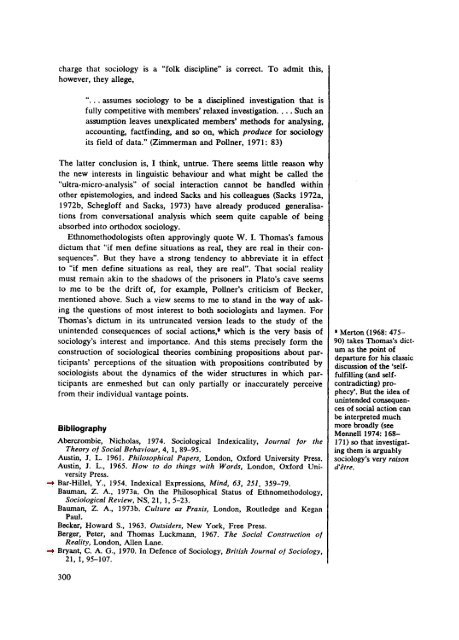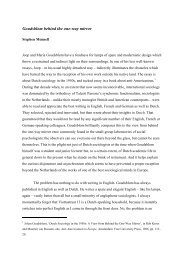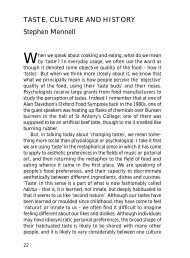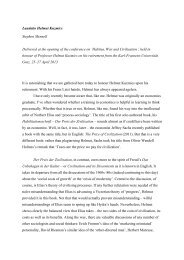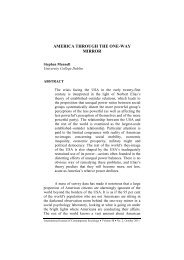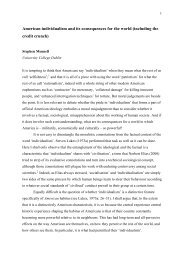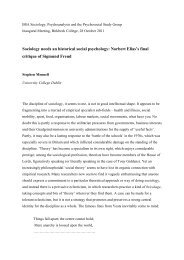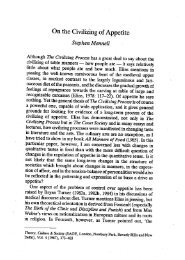Ethnomethodology and the New "Methodenstreit" - Stephen Mennell
Ethnomethodology and the New "Methodenstreit" - Stephen Mennell
Ethnomethodology and the New "Methodenstreit" - Stephen Mennell
You also want an ePaper? Increase the reach of your titles
YUMPU automatically turns print PDFs into web optimized ePapers that Google loves.
charge that sociology is a "folk discipline" is correct. To admit this,however, <strong>the</strong>y allege,assumes sociology to be a disciplined investigation that isfully competitive with members' relaxed investigation.... Such anassumption leaves unexplicated members' methods for analysing,accounting, factfinding, <strong>and</strong> so on, which produce for sociologyits field of data." (Zimmerman <strong>and</strong> Pollner, 1971: 83)The latter conclusion is, I think, untrue. There seems little reason why<strong>the</strong> new interests in linguistic behaviour <strong>and</strong> what might be ca}led <strong>the</strong>"ultra-micro-analysis" of social interaction cannot be h<strong>and</strong>led withino<strong>the</strong>r epistemologies, <strong>and</strong> indeed Sacks <strong>and</strong> his colleagues (Sacks 1972a,1972b, Schegloff <strong>and</strong> Sacks, 1973) have already produced generalisationsfrom conversational analysis which seem quite capable of beingabsorbed into orthodox sociology.Ethnomethodologists often approvingly quote W. I. Thomas's famousdictum that "if men define situations as real, <strong>the</strong>y are real in <strong>the</strong>ir consequences".But <strong>the</strong>y have a strong tendency to abbreviate it in effectto "if men define situations as real, <strong>the</strong>y are real". That social realitymust remain akin to <strong>the</strong> shadows of <strong>the</strong> prisoners in Plato's cave seemsto me to be <strong>the</strong> drift of, for example, Poliner's criticism of Becker,mentioned above. Such a view seems to me to st<strong>and</strong> in <strong>the</strong> way of asking<strong>the</strong> questions of most interest to both sociologists <strong>and</strong> laymen. ForThomas's dictum in its untruncated version leads to <strong>the</strong> study of <strong>the</strong>unintended consequences of social actions,' which is <strong>the</strong> very basis ofsociology's interest <strong>and</strong> importance. And this stems precisely form <strong>the</strong>construction of sociological <strong>the</strong>ories combining propositions about participants'perceptions of <strong>the</strong> situation with propositions contributed bysociologists about <strong>the</strong> dynamics of <strong>the</strong> wider structures in which participantsare enmeshed but can only partially or inaccurately perceivefrom <strong>the</strong>ir individual vantage points.BibliographyAbercrombie, Nicholas, 1974. Sociological Indexicality, Journal for <strong>the</strong>Theory of Social Behaviour, 4, 1, 89-95.Austin, J. L. 1961. Philosophical Papers, London, Oxford University Press.Austin, J. L., 1965. How to do things with Words, London, Oxford UniversityPress.Bar-Hillel, Y., 1954. Indexical Expressions, Mind, 63, 251, 359-79.Bauman, Z. A., 1973a. On <strong>the</strong> Philosophical Status of <strong>Ethnomethodology</strong>,Sociological Review, NS, 21, 1, 5-23.Bauman, Z. A., 1973b. Culture as Praxis, London, Routledge <strong>and</strong> KeganPaul.Becker, Howard S., 1963. Outsiders, <strong>New</strong> York, Free Press.Berger, Peter, <strong>and</strong> Thomas Luckmann, 1967. The Social Construction ofReality, London, Allen Lane.Bryant, C. A. G., 1970. In Defence of Sociology, British Journal of Sociology,21, 1, 95-107.* Merton (1968: 475-90) takes Thomas's dictumas <strong>the</strong> point ofdeparture for his classicdiscussion of <strong>the</strong> 'selffulfilling(<strong>and</strong> selfcontradicting)prophecy'.But <strong>the</strong> idea ofunintended consequencesof socal action canbe interpreted muchmore broadly (see<strong>Mennell</strong> 1974: 168-171) so that investigating<strong>the</strong>m is arguablysociology's very raisond'etre.300


